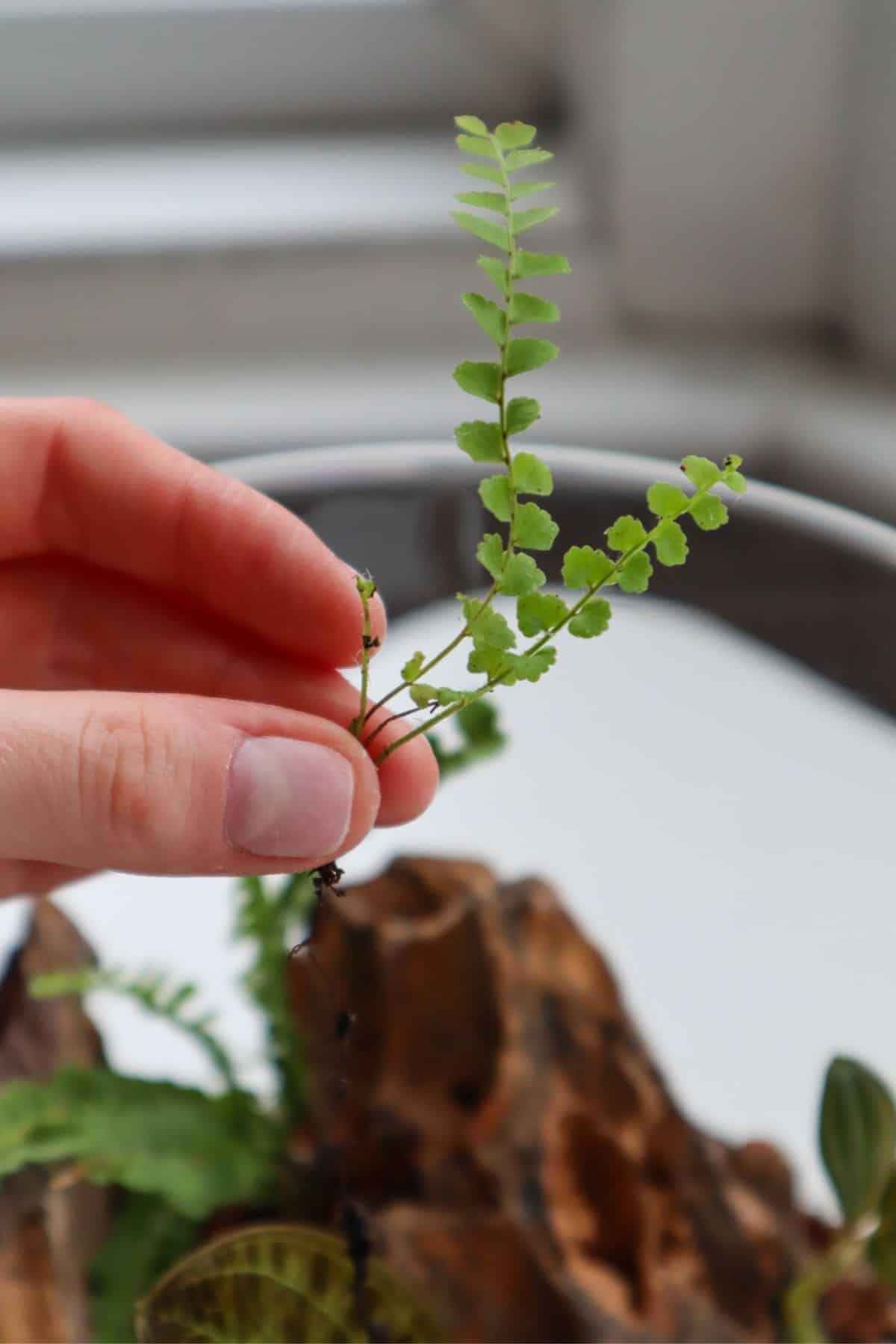With its fan-shaped fronds that look exactly like eyelashes, the stunning Eyelash Fern is a plant that packs a tonne of personality into a tiny package.
Its scientific name, Actiniopteris australis, is also rather fitting, with “actini” referring to radiant energy and “pteris” translating to fern/feathery.
Like a good mascara, it will add plenty of volume, definition, and texture to a terrarium.
It has a bit of a reputation for being hard to please, but in this guide, I’ll teach you how to care for it, so get ready to bat your eyelashes a little!

Where to Buy Eyelash Fern
See the links below to purchase from reputable terrarium plant shops and marketplaces (may include affiliate links).
Eyelash Fern Care Tips
| Plant Type | Fern |
| Lighting | Medium – high indirect light |
| Temperature | 60-85°F (15-30°C) |
| Watering | Regular, even moisture |
| Humidity | Medium-high humidity (50-80%) |
| Growth | Up to 6 inches |
Lighting Requirements
As a good rule of thumb, the more delicate the plant’s foliage, the more sensitive it will be to direct sunlight. And that is certainly true for the Actiniopteris australis.
Not one for the limelight; in nature, this beautiful plant grows in the shade of larger trees, staying out of the harsh sunlight.
So, for best results, keep this plant in moderate-bright indirect light.
A North-facing windowsill would be a perfect situation if you’re in the Northern Hemisphere.

Watering Requirements
Though you couldn’t tell by looking at it, the sweet Eyelash Fern is one seriously thirsty plant.
So, as with many ferns, you’ll want to keep it as moist as possible, not allowing the soil to dry out between waterings.
I’d also always advise avoiding terracotta pots for this reason – they wick too much moisture away from the soil, so you’d have an even harder time keeping up with demand.

However, I completely forgot to water my plant one time. It had been about a week since watering, and I doubt it would have bounced back if I hadn’t remembered when I did.
It’s best to check every other day or so to avoid this!

As always, if you’re putting your plant in a terrarium, it’s hard to remove water once you’ve added it, so start small and add more if you need.
Best Fern Soil/Substrate
To further support this need for moisture, choosing the right soil is very important.
For the bulk of your mix, moisture-retentive materials such as coco coir and sphagnum moss are ideal.
But just as much as hydration is important, so is drainage. You’ll need to water this plant super frequently, and you don’t want water to pool in the soil (which could result in root rot).
There are two ways to make sure this doesn’t happen.
- Add “chunky” elements that boost drainage into the substrate. This could be orchid bark, charcoal, pumice, or lava rock.
- Make sure you choose a pot with a drainage hole. If you’re building a terrarium, create a false bottom (aka drainage layer).

Temperature & Humidity
As you may have guessed, Actiniopteris australis is native to Australasia, but it’s also native to parts of Africa and Asia.
In fact, this plant will pretty much grow anywhere with consistently high humidity levels.
60% would be ideal, and I’d make sure it doesn’t drop below 50%.

While it has a preference for warm temperatures, keeping up with demand on the humidity and moisture front will be far more important.
As long as your home is a comfortable temperature for you, your plant should be fine. Around the 70°F (21°C) mark is great, but it’ll be fine if it drops a bit lower during the night or colder months.
Of course, all this makes the Eyelash Fern a fantastic closed terrarium plant. It will absolutely thrive in there!

Actiniopteris australis Growth
Terrarium builders rejoice for this is a rare, fabled plant that will actually stay small.
That’s right, Actiniopteris australis will stay cute and dainty, never growing beyond 6 inches. Hurrah!
Despite staying small, it will get more lush and dense as it matures.
New fronds unfurl from thin stems at the center of the plant, gradually fanning out more as it grows.

The result is a tiny, frilly delight. What’s not to love?
How to Propagate
The Eyelash Fern is easily propagated via division.
And to do that, first and foremost, your plant must be healthy. Dividing is really disruptive for a plant, and the Eyelash Fern isn’t known for its resilience, so better safe than sorry.
So, as long as your plant is healthy, go ahead and take it out of its pot or terrarium. Then, with your thumbs, separate the fronds into two sections and do the same for the roots.

You want a decent amount of foliage and roots on each plant.
If necessary, use scissors to snip through any tough rhizome or roots that you can’t separate by yourself. It’s okay if you lose a little bit along the way.

Then, plant up your new plant babies in a pot or terrarium.
Varieties & Similar Plants
The Actiniopteris family is extremely small compared to some other fern families.
There are a few other, very rare species, but nothing you can buy commercially.
I was about to introduce what I thought was the only other significant player, Actiniopteris radiata, but it turns out it’s just a synonym for the australis. So, unfortunately, there’s only one Eyelash Fern to get your hands on.
If you’re looking for more dinky terrarium-ready ferns for your next project, check out the Lemon Button Fern and the Heart Fern.

